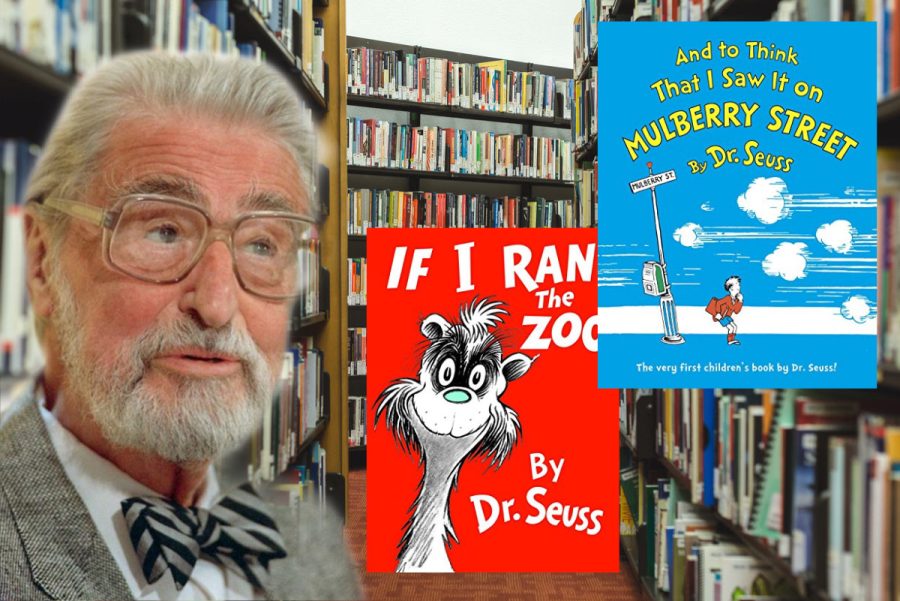Dr. Suess must be reframed for his previous racist work
Photo by Caroline Harless/Creative Commons
Theodor Suess Giesel, also known as Dr. Suess, is shown next to his two books, “And To Think That I Saw It On Mulberry Street” and “If I Ran The Zoo.” Both well-known books have been included on an updated list of six banned Dr. Suess books, deemed too offensive for publications.
March 24, 2023
March 2nd marks the birthday of one of the most well-known and influential authors of all time: Theodor Seuss Geisel, better known as Dr. Seuss. Throughout the early to mid 1900s, Dr. Seuss created some of the most memorable and imaginative characters and stories in the history of children’s literature. Seuss’ unique style of storytelling, playful rhymes, and whimsical illustrations have captivated generations of readers, and continue to do so to this day.
However, in recent years, a number of Dr. Seuss’s cartoons have resurfaced in a negative light due to racist and offensive content. Despite writing lots of books that resonate with so many children, should Dr. Suess still be remembered positively?
Throughout his career, Dr. Seuss wrote and illustrated more than 60 books, many of which have become classics. His stories often contained important lessons about individuality, acceptance and the power of imagination. Suess’s stories continue to be entertaining for readers of all ages. In reality though, if even a small minority of his books promote racism and discriminatory ideas, that leaves a permanent mark on his legacy and his famous children’s books.
Despite paving the way for his later success, Suess’ first book “And to Think That I Saw It on Mulberry Street” has been subject to harsh controversy and criticism regarding its several examples of intolerable racist depictions. One appalling example from the books is when Suess depicted a character in his book as Chinese and drew them with yellow skin and a queue hairstyle as well as slanted lines for eyes. Although it may seem painfully obvious that this is explicit anti-Asian racism, this book was published more than 80 years ago, and people are only learning about this recently.
Regardless of generational fame, it is unacceptable for someone who was so openly racist to still be shown to children in the same light as they once were. No child should read a book that shows those of any race in a discriminatory fashion, or a book from an author that holds such stereotypes in the first place. That is simply setting a poor example for our youth and the next generation and feeding into harmful, divisive thinking.
Dr. Seuss began his career as a cartoonist and illustrator for magazines and advertisements. He made cartoons for fun, as well, where many more of his offensive cartoons are apparent. Suess infamously depicted African-Americans, Asian-Americans and Jewish people in a demeaning manner in various racist advertisements and political cartoons. The same man who wrote and drew “The Cat in The Hat” and “One Fish, Two Fish” to entertain children used his talent to produce anti-Japanese-American cartoons and racist pesticide advertisements to entertain other bigots. Scary.
Supporters of Seuss may point to the fact that he was also a prolific artist and philanthropist. Later in life, he established the Dr. Seuss National Memorial Sculpture Garden in his hometown of Springfield, Massachusetts and the Dr. Seuss Foundation, which supports literacy programs and other educational initiatives. Quite on the contrary, Suess’ personal life is much darker than it seems.
Dr. Suess notoriously had an affair when his wife, Helen Palmer-Geisel, when she fell awfully ill. As Palmer-Giesel was suffering from partial-paralysis and eventually cancer, Suess ruthlessly announced his affair with Audrey Stone Dimond, showing no signs of remorse. Palmer-Giesel ultimately committed suicide because of Suess’s ruthless decisions, later discovered in her suicide note.
On top of that, according to a Sep. 2015 article from Daily News, it was disclosed by Dimond to PBS that Suess didn’t like children, and often questioned their thought-processes of children. Odd for a children’s author.
Back in Mar. 2021, President Biden left mention of Dr. Suess out of his speech on Reading Across America Day, and rightfully so. Dr. Suess was probably one of the most successful authors when it came to pleasing young audiences, but as society and universal beliefs have evolved, Dr. Suess is no longer fit to be the idolized author he once was and should not projected as one of the main historical figures in children’s book authors and literature overall.




